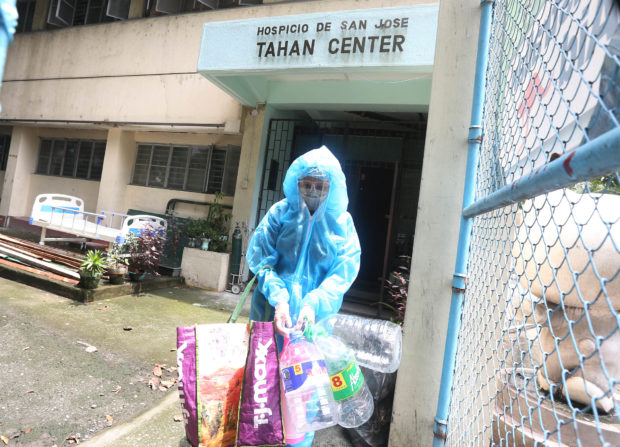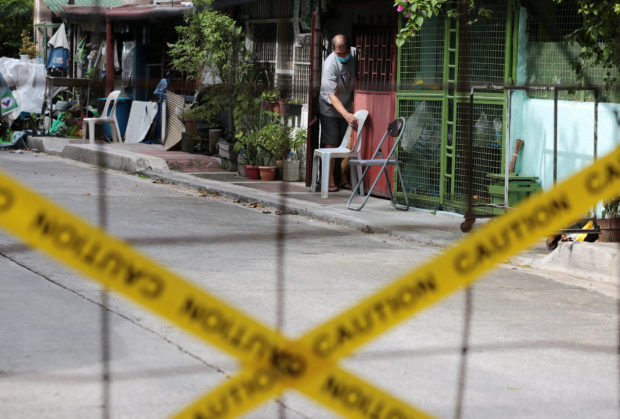DOH confirms Delta variant in NCR, Calabarzon as COVID-19 cases reach 18,332

MEDICAL WATCH: A nurse wearing personal protective equipment runs errands at Hospicio de San Jose in Manila as medical teams look after 103 people — among them children, the elderly, and shelter staff — who tested positive for COVID-19. (Photo by MARIANNE BERMUDEZ / Philippine Daily Inquirer)
MANILA, Philippines — The Department of Health (DOH) reported on Monday a new record high 18,332 COVID-19 cases as it confirmed the community transmission of the highly contagious Delta variant of the novel coronavirus in Metro Manila (or the National Capital Region) and the nearby region of Calabarzon (Cavite, Laguna, Batangas, Rizal and Quezon).
Before the Aug. 23 tally, the DOH reported a record 17,231 COVID-19 cases on Aug. 20, which was the highest number of infections after the 15,310 cases reported on April 2.
The country’s caseload now stands at 1,857,646, of which 130,350 are active cases.
Majority or 94.8 percent of these cases are mild, 2.5 percent are asymptomatic, 0.92 percent are moderate, 0.6 percent are critical and 1.2 percent are severe.
Meanwhile, 13,794 patients have recovered, bringing total recoveries to 1,695,335.
Article continues after this advertisementBut the death toll reached 31,961, after 151 more people have died, 68 of whom were previously tagged as recovered cases. This was the sixth consecutive day with at least 150 reported deaths.
Article continues after this advertisementThree of 278 laboratories of the DOH did not submit their results.
The health department on Monday also acknowledged community transmission of the Delta variant in the National Capital Region (NCR) and in Calabarzon (Region IV-A).
Since genome analysis remained limited, the DOH emphasized that it “needs further evidence to support the announcement of the whole country to have community transmission of the Delta variant.”
It added: “However, community transmission was identified in Region IV-A and in NCR based on the following observations: 1. Large numbers of Delta cases and 2. Case investigations and phylogenetic analysis showed that these cases cannot be epidemiologically linked to each other nor source/s of infection determined.”
“The DOH, the national government, and the local government units, however, have since responded as if there is already community transmission,” it said.
First case
First detected in India late last year, the Delta variant has become the dominant COVID-19 variant globally, according to the World Health Organization.
The DOH reported the first Delta variant on May 11—a 37-year-old who returned on April 10 from Oman where he worked and was tested on April 15.
The second case was a 58-year-old man who returned on April 19 from the United Arab Emirates and tested positive for COVID-19 on April 24.
The two have since recovered and are back in their home provinces in the Soccsksargen (South Cotabato, Cotabato, Sultan Kudarat, Sarangani and General Santos) and Bicol regions, respectively.
On July 16, the country confirmed its first locally transmitted cases, totaling 11, one of whom had died.
The country recorded 1,273 Delta variant cases as of Monday, the DOH said.
But it also noted that most of these cases had already been tagged as “recovered.”
‘No longer effective’
The department has also acknowledged that enforcing a hard lockdown or enhanced community quarantine (ECQ) was no longer an effective strategy against COVID-19.
“Widespread lockdowns and restrictions appear to be no longer effective for our country,” Health Undersecretary Maria Rosario Vergeire said at her press briefing.
“It looks like it’s not really being effective anymore. Although it’s a major factor to restrict over a large area, in our view when we weighed what could happen, it will be more effective and advantageous for all if we downgrade (the lockdown) a little but we do granular lockdowns and improve factors in PDITR,” Vergeire added, as she also referred to the strategy of Prevention, Detection, Isolation, Treatment and Reintegration.

NO MOVEMENT: In this photo taken early this month, a resident of H. Ocampo Street in Barangay UP Campus, Quezon City, puts out chairs outside his house to serve as trays for food packs as the area undergoes a special concern lockdown due to a spike in COVID-19 cases. (Photo by GRIG C. MONTEGRANDE / Philippine Daily Inquirer)
The DOH and expert-advisers, she said, have analyzed the impact of the hard lockdowns implemented since the pandemic started, first in March 2020, July to August 2020, March to April 2021 and this August 2021.
She noted that most other countries had gradually opened their economy while enforcing some restrictions locally.
‘Micro-herd immunity’
“On the health side, as long as we are able to have active case finding, improved vaccination coverage, shortened detection to isolation [and] compliance to minimum public health standards, the modified ECQ plus all these are already something we can rely on, as long as all of us will continue to cooperate so cases will go down,” Vergeire said.
Presidential Adviser for Entrepreneurship Joey Concepcion reiterated the proposal to implement a “micro-herd immunity” approach, with travel bubbles for the vaccinated and unvaccinated groups.
In an online forum on Monday, Concepcion called for allowing the fully vaccinated to move freely and enter business establishments instead of imposing lockdowns to enable the safe reopening of the economy.
“In this proposal, we are protecting the unvaccinated. As seen in all news reports and even with my dialogues with many of the doctors in hospitals in Metro Manila, the greatest number of [admissions] are coming from the unvaccinated,” he said.
He added, “The bubble that we have to create has to be a much stronger bubble. The greater number of people who will take the vaccine increases the strength of that bubble.”
“This road map of really trying to bridge both — helping both lives and livelihoods — can be well-established if we promote this micro-herd immunity,” Concepcion said.
—WITH REPORTS FROM JANE BAUTISTA AND INQUIRER RESEARCH
For more news about the novel coronavirus click here.
What you need to know about Coronavirus.
For more information on COVID-19, call the DOH Hotline: (02) 86517800 local 1149/1150.
The Inquirer Foundation supports our healthcare frontliners and is still accepting cash donations to be deposited at Banco de Oro (BDO) current account #007960018860 or donate through PayMaya using this link.